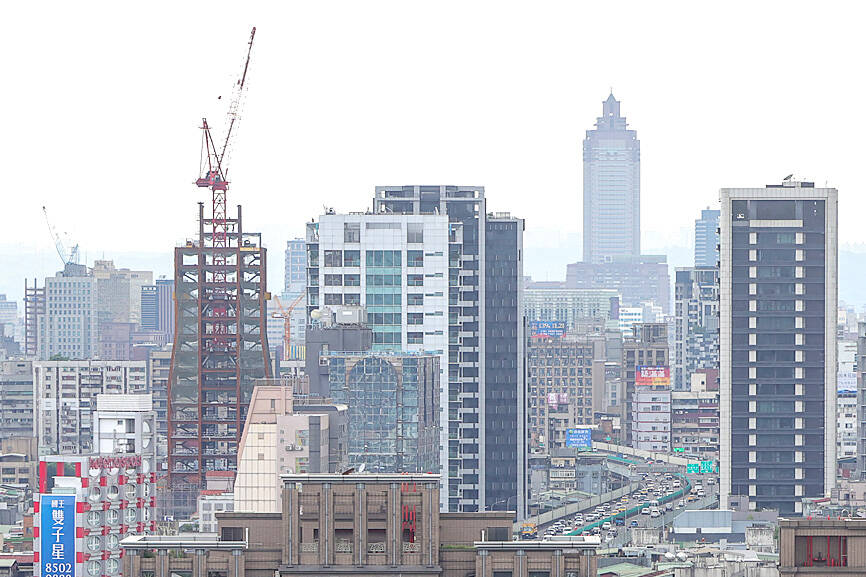Property transactions last month totaled 20,678 units in the nation’s six special municipalities, shrinking 3 percent from a month and a year earlier, as the market continued to digest unfavorable policy measures at a moderate pace, analysts said yesterday.
Property deals retreated 24 percent annually in the first quarter, narrowing to 13 percent year-on-year last quarter, Taiwan’s sole listed broker Sinyi Realty Inc (信義房屋) said, citing data from the civic bureaus of Taipei, New Taipei City, Taoyuan, Taichung, Tainan and Kaohsiung.
The data could suggest there are signs of stabilization, although the market might need more time to acclimatize to the central bank’s new lending restrictions on second-home mortgages introduced on June 15 and the implementation this month of the bans on transfers of pre-sale house purchase agreements, Sinyi research manager Tseng Ching-der (曾敬德) said.

Photo: CNA
There is a fair chance that trading volume would hold steady this month compared with a year earlier, after logging a 3 percent decline last month, indicating that the worst is over and potential buyers have started to regain confidence, Tseng said.
Taipei and Taichung fared better than other areas with a year-on-year increase of 14 percent and 7 percent respectively due to new housing delivery, Sinyi said.
Tainan and Kaohsiung underperformed with a year-on-year slump of 26 percent and 8 percent respectively, as the property fever that had been sparked by the capacity expansion plans of major local tech firms subsided, it said.
The mixed results showed that people on average remain cautious and the market would consolidate in the near future, Taiwan Realty Co (台灣房屋) said.
Summer could be the low season for property transactions, as many people are expected to go on vacation abroad after three years of COVID-19 restrictions, it said, adding that Ghost Month would also be unfavorable.
Taiwanese avoid business transactions during Ghost Month, which is from Aug. 16 to Sept. 14 this year.

Taiwan’s long-term economic competitiveness will hinge not only on national champions like Taiwan Semiconductor Manufacturing Co. (TSMC, 台積電) but also on the widespread adoption of artificial intelligence (AI) and other emerging technologies, a US-based scholar has said. At a lecture in Taipei on Tuesday, Jeffrey Ding, assistant professor of political science at the George Washington University and author of "Technology and the Rise of Great Powers," argued that historical experience shows that general-purpose technologies (GPTs) — such as electricity, computers and now AI — shape long-term economic advantages through their diffusion across the broader economy. "What really matters is not who pioneers

In a high-security Shenzhen laboratory, Chinese scientists have built what Washington has spent years trying to prevent: a prototype of a machine capable of producing the cutting-edge semiconductor chips that power artificial intelligence (AI), smartphones and weapons central to Western military dominance, Reuters has learned. Completed early this year and undergoing testing, the prototype fills nearly an entire factory floor. It was built by a team of former engineers from Dutch semiconductor giant ASML who reverse-engineered the company’s extreme ultraviolet lithography (EUV) machines, according to two people with knowledge of the project. EUV machines sit at the heart of a technological Cold

TAIWAN VALUE CHAIN: Foxtron is to fully own Luxgen following the transaction and it plans to launch a new electric model, the Foxtron Bria, in Taiwan next year Yulon Motor Co (裕隆汽車) yesterday said that its board of directors approved the disposal of its electric vehicle (EV) unit, Luxgen Motor Co (納智捷汽車), to Foxtron Vehicle Technologies Co (鴻華先進) for NT$787.6 million (US$24.98 million). Foxtron, a half-half joint venture between Yulon affiliate Hua-Chuang Automobile Information Technical Center Co (華創車電) and Hon Hai Precision Industry Co (鴻海精密), expects to wrap up the deal in the first quarter of next year. Foxtron would fully own Luxgen following the transaction, including five car distributing companies, outlets and all employees. The deal is subject to the approval of the Fair Trade Commission, Foxtron said. “Foxtron will be

INFLATION CONSIDERATION: The BOJ governor said that it would ‘keep making appropriate decisions’ and would adjust depending on the economy and prices The Bank of Japan (BOJ) yesterday raised its benchmark interest rate to the highest in 30 years and said more increases are in the pipeline if conditions allow, in a sign of growing conviction that it can attain the stable inflation target it has pursued for more than a decade. Bank of Japan Governor Kazuo Ueda’s policy board increased the rate by 0.2 percentage points to 0.75 percent, in a unanimous decision, the bank said in a statement. The central bank cited the rising likelihood of its economic outlook being realized. The rate change was expected by all 50 economists surveyed by Bloomberg. The